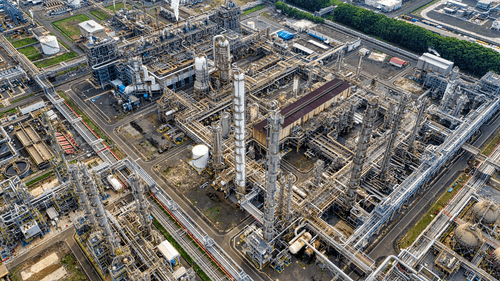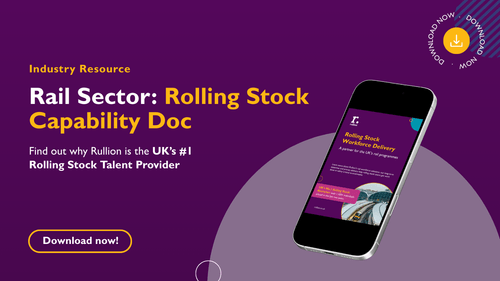The Future of Nuclear energy with Guillem Sanchis Ramírez
Welcome back to Rullion Reflections, our video interview series spotlighting the people driving change in the UK and European nuclear industry. In Episode 5, Sibel Akel, Marketing Director at Rullion, sits down with Guillem Sanchis Ramírez, a nuclear engineer at IDOM Consulting, advancing the technical boundaries of the industry while also working to shift public perception, helping society see the future of nuclear energy as part of the solution, not the problem.
Watch the full interview with Guillem or read on for the key highlights from the conversation.
Planting the seeds of passion for Nuclear energy
For some, a career path is a straight line. For others, it’s a winding journey sparked by chance encounters. For Guillem, the spark came from an unexpected place: a high school teacher.
At the time, it was just a passing idea. But, like the film Inception, the idea became a seed that lay dormant until years later, when Guillem was studying physics. When faced with the choice of which path to take, he explored everything from batteries to renewables. Yet he kept circling back to nuclear. It promised not only scale and reliability but also the chance to make a real impact on the future of clean energy.
That decision led Guillem to pursue a Master’s in Nuclear in 2021. Just a few years later, he’s part of the team at IDOM Consulting in Barcelona, contributing to projects both in Spain and internationally. Guillem specialises in thermohydraulics - building and tuning plant models to test new systems before they go anywhere near a live reactor. He describes the work as dynamic, varied, and constantly challenging, in the best way.
“I spend most of my time on thermohydraulics… Running computer simulations of how a power plant works. You get to experiment with models and try out new systems that then go into real nuclear plant operations. It’s definitely challenging but I love how dynamic the work is. We do all sorts of projects, from the operation of established plants to research reactors to fusion. You get to learn a lot of different points of view in the industry, and that’s been really enjoyable.”
Bridging the perception gap
Despite supplying nearly 20% of Spain’s electricity in 2024, nuclear energy has long suffered from weak public support. Guillem points to decades of poor communication as one of the reasons. For too long, the loudest voices in the debate were its critics, leaving the industry without a strong narrative of its own.
But times are changing for the future of nuclear energy. With climate change accelerating the need for low-carbon energy, nuclear is stepping back into the spotlight as part of the solution.
In April 2024, 58% of Spaniards supported extending the operating lives of existing nuclear plants, reflecting growing acceptance of nuclear’s role in energy transition. This is a stark contrast to 2011, when Spain ranked among the most opposed countries to nuclear energy, with 55% of Spaniards saying they wanted all nuclear plants closed. However, 70% of Spaniards felt the government was not ensuring a fair energy transition, suggesting that while support is rising, people remain concerned about how the transition is managed.
For Guillem, that evolving balance mirrors what he encounters when he talks about his career. Instead of fear, the most common reaction he encounters is curiosity.
That curiosity is powerful. It opens the door to conversations where myths can be challenged and facts can be shared.
For Guillem, each question is a chance to turn curiosity into understanding and understanding into support.
Advocacy through Econucleares
Guillem’s passion to spark a new kind of public conversation doesn’t stop at his day job. Together with a colleague, he co-founded Econucleares, an organisation dedicated to keeping Spain’s reactors open and changing perceptions of the industry.
It’s an urgent mission. According to government proposals, Spain’s seven reactors, responsible for around 20% of the country’s electricity, could be closed within the next decade. For Guillem, that makes little sense, either economically or environmentally.
Econucleares' aim is to put Spain firmly back on the nuclear map, alongside the many countries now expanding their programmes. Globally, momentum is growing. More than 20 countries have pledged to triple nuclear capacity by 2050, with landmark projects like ITER in France pushing the boundaries of fusion research.
Part of the group’s mission is to make nuclear more relatable. A favourite of Guillem’s was a mug printed with the Spanish wording ‘La cantidad de combustible nuclear que necesitas para toda tu vida cabe en esta taza.’ It implied that a single mug could contain all the nuclear fuel required for an individual's lifetime. “It’s very visual,” he says with a smile. “People loved it.”
Powering the future of nuclear energy
As Guillem is quick to stress, technology alone won’t secure the future of nuclear. It will be people who decide its fate. And here lies one of the industry’s biggest challenges: talent.
Across Europe and beyond, the nuclear workforce is ageing. The next generation of engineers, physicists, electricians, and welders will be critical to meeting future demand.
“The key bottleneck seems to be qualified workers,” Guillem explains. The demand spans every level of expertise. For young people, nuclear offers a career that is both well-paid and respected. For experienced professionals in other sectors, from coal to renewables, retraining can open the door to opportunities in an industry that will shape our energy future.
It’s about reframing nuclear for what it truly is: a vital part of tackling climate change and securing clean, reliable energy.
As Guillem puts it, nuclear has the power to deliver ‘a future of abundance, of clean, affordable energy’. Whether that vision becomes reality will depend on how boldly the industry tells its story and how many people, like Guillem, are inspired to be part of it.
Ready to start your own nuclear career? View our latest nuclear jobs.
Watch the full interview here.
Powering the Future of Nuclear Starts With People
At Rullion, we work with pioneering organisations across the UK nuclear industry to find, attract, and support the people who are driving change. Whether you're scaling new technologies, meeting regulatory milestones, or shaping the next generation of clean energy jobs in the UK, we're here to help.





